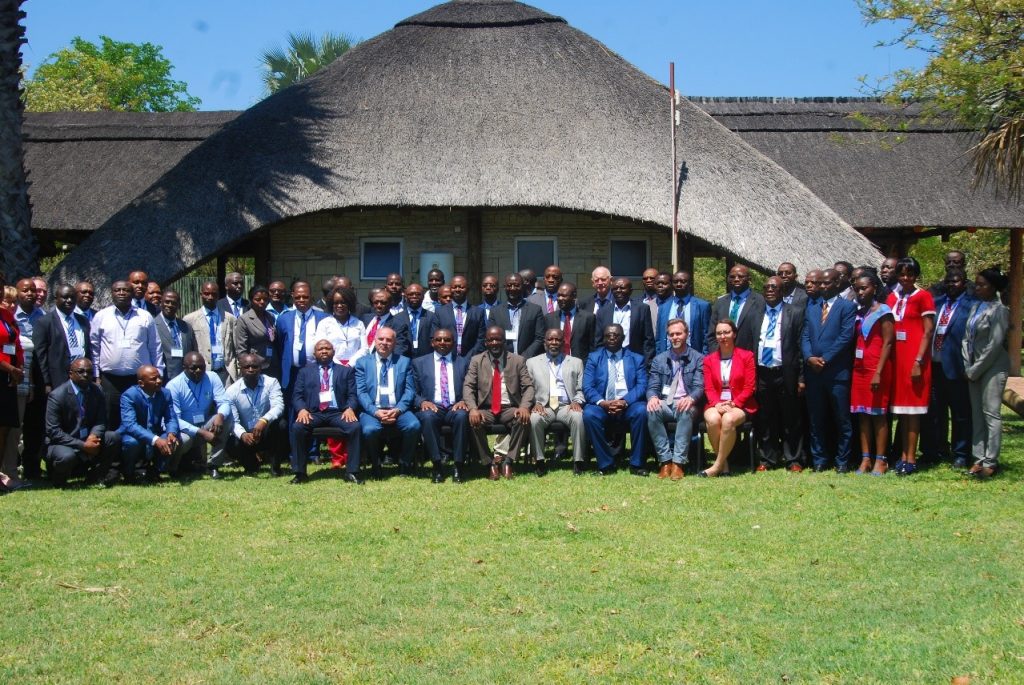The eleventh Annual General Meeting of the Eastern and Southern Africa Water and Sanitation (ESAWAS) Regulators Association was held in Livingstone, Zambia from 1st- 3rd November, 2017. The meeting was hosted by the National Water Supply and Sanitation Council (NWASCO) at the David Livingstone Hotel in Livingstone, Zambia, under the theme: Water Integrity and SDG6– designing appropriate regulation.
The three-day meeting which drew over 70 participants was attended by the seven of the ten members of ESAWAS, as well as representatives from the Ministry of Water for Botswana, Water Integrity Network (WIN), African Ministers Council on Water (AMCOW), African Forum for Utility Regulators (AFUR), Region of Production and Distribution of Water and Electricity (REGIDESO) of Burundi, Utility Regulation Authority (URA) of Mauritius, Water Sector Regulatory Council (WSRC) of Palestine, Combined Harare Residents Association of Zimbabwe, Climate Resilience Infrastructure Development Fund (CRIDF), Transparency International Zambia (TIZ), Action for Water, WaterAid, Zambia Water Partnership, COWI, the Dar es Salaam Water and Sanitation Corporation (DAWASCO), Agencia de Desenvolvimento Economico da Província de Manica (AdeM) of Mozambique, Water and Sewerage Company (WASCO) of Lesotho and the Water Resources Management Authority (WARMA).
Local representation was also from Water and Sanitation Association of Zambia (WASAZA), GIZ, WASH, Lukanga Water and Sewerage Company (LgWSC), Eastern Water and Sanitation Company (EWSC) and other local stakeholders.
The opening was officiated by the Minister of Water Development, Sanitation and Environmental Protection- Honorable Lloyd Kaziya.
The meeting begun with welcoming remarks by Livingstone City Town Clerk Ms Gertrude Chibiliti, as well as Livingstone City Mayor, His Worship Eugene Mapuwo. This was followed by remarks from NWASCO Director Eng. Kelvin Chitumbo. ESAWAS Chairperson Mr Magalhaes Miguel in his remarks stated that the theme had been chosen on the realization that achieving SDG6 requires water integrity and thanked Water Integrity Network (WIN) for playing a key role in guiding the programme for the meeting, based on their extensive experience in promoting water integrity. This was followed by remarks by the Permanent Secretary of Ministry of Water Development, Sanitation and Environmental Protection Dr. Bishop Ed Chomba.
The meeting was officially opened by the Honorable Minister of Water Development, Sanitation and Environmental Protection. In his opening speech, the Minister recognized that ESAWAS has widened its reach to not only regulators, but rather incorporate the WSS utilities, as well as various key stakeholders in the water Ssector, beyond the scope of the Eastern and Southern African region. He reiterated that water is life and sanitation is dignity, yet the water sector is not immune from corruption. He stated that the theme of this conference, ‘Water Integrity and SDG6’ underscores a very important issue and that the theme is opportune in designing appropriate interventions for the water sector in order to achieve the SDGS. He added that regulators, and indeed all stakeholders, can play a pivotal role in enforcing and monitoring the implementation of the three pillars of TAP in water supply and sanitation service delivery to improve governance and maintain water integrity. He urged delegates to carefully consider the areas where integrity must be enforced and the appropriate interventions required.
The meeting structured around the theme “Water Integrity and SDG6– designing appropriate regulation” was conducted over three-days with day one and two of the programme focussed on conferencing and discussions on the theme and included presentations on:
- Water Integrity and the case for Regulation
- Hidden water losses
- Impacts of non-integrity on WSS service delivery and institution sustainability – major risks of corruption in water
- Role of regulators in monitoring SDG6.1&2
- Safeguarding independence and integrity of regulatory institutions
- Improving integrity in service delivery through appropriate guidelines and capacity development
- Indicators for assessing the integrity of public water utilities
- Collaboration between water regulators and other oversight and enforcement institutions – Closing the compliance gap from regulation to enforcement
- Collaboration between regulators and consumers – holding utilities to account
- Benchmarking of Large WSS Utilities in the region– highlights of 3rd benchmarking report
- Regulatory Peer Review Findings of LEWA, Lesotho –improving regulatory performance by peer comparison
- CRIDF (Climate Resilience Infrastructure Development Facility)
- AFUR-(African Forum for Utility Regulators) – enhancing cooperation and linkage
